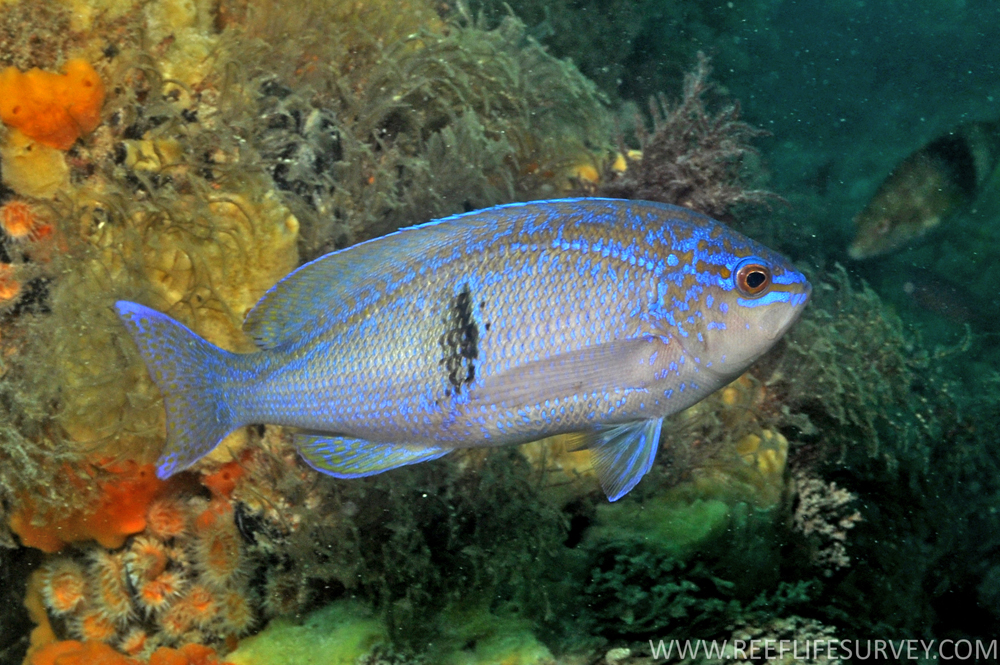Barber Perch, Caesioperca rasor (Richardson 1839)

A male Barber Perch, Caesioperca rasor, in Port Phillip, Victoria. Source: Rick Stuart-Smith / Reef Life Survey. License: CC BY Attribution
Barber Perch form large schools on sheltered coastal reefs, where they feed on plankton above rocky reefs, outcrops and drop-offs. The closely-related Butterfly Perch usually occurs in more exposed habitats on deeper reefs.
Barber Perch, Caesioperca rasor (Richardson 1839)
More Info
|
Distribution |
Endemic to temperate waters of southern Australia, from Eden, New South Wales, to about Albany, Western Australia, including around Tasmania. The species may occur further north on the west coast. Barber Perch form large schools on sheltered coastal reefs, feeding on plankton above rocky reefs, outcrops and drop offs at depths of 7-100 m. Although they form schools with Butterfly Perch, they are usually found at shallower depths and in more sheltered habitats. |
|
Features |
Dorsal fin X-XI, 19-21; Anal fin III, 9-10; Caudal fin 17; Pectoral fin 14-15; Pelvic fin I, 5; Lateral line scales47-55; Vertebrae 11 + 15. Body slender, compressed; pectoral fins elongate; dorsal fin long-based; tail forked. |
|
Size |
To 26 cm |
|
Colour |
Males and females are sexually dimorphic in colour. Males are bluish above, yellowish on the sides with a distinct vertical black bar above anal-fin spines. Females are pinkish with a blue line below the eye; small juveniles are pink with a dark mauve head. |
|
Feeding |
Carnivores - feed on zooplankton |
|
Biology |
Females spawn pelagic eggs, and the larvae are pelagic. |
|
Fisheries |
Occasionally taken by recreational anglers. |
|
Remarks |
In some areas, Barber Perch and Butterfly Perch, Caesioperca lepidoptera, form mixed schools. |
|
Similar Species |
Differs from the closely-related Butterfly Perch, Caesioperca lepidoptera, in having a more slender body, and in males being more bluish with a dark bar rather than a blotch on the midside. |
|
Species Citation |
Serranus rasor Richardson, 1839, Proc. Zool. Soc. London 7: 95. Type locality: Port Arthur, Tasmania |
|
Author |
Bray, D.J. 2021 |
|
Resources |
Barber Perch, Caesioperca rasor (Richardson 1839)
References
Castelnau, F.L. de 1872. Contribution to the ichthyology of Australia. 1. The Melbourne fish market. Proceedings of the Zoological and Acclimatisation Society of Victoria 1: 29-242 1 pl.
Castelnau, F.L. de 1873. Contribution to the ichthyology of Australia. 3. Supplement to the fishes of Victoria. Proceedings of the Zoological and Acclimatisation Society of Victoria 2: 37-58 (described as Lacepedia cataphracta) See ref at BHL
Coleman, N. 1980. Australian Sea Fishes South of 30ºS. Lane Cove, NSW : Doubleday Australia Pty Ltd 309 pp.
Edgar, G.J. 2008. Australian Marine Life: the plants and animals of temperate waters. Sydney : Reed New Holland 2, 624 pp.
Hutchins, J.B. & Thompson, M. 1983. The Marine and Estuarine Fishes of South-western Australia. Perth : Western Australian Museum 103 pp. 345 figs
Klunzinger, C.B. 1872. Zur Fische-fauna von Süd Australien. Archiv für Naturgeschichte 38(1): 17-47 pl. 2 (described as Anthias rasor extensa) See ref at BHL
Kuiter, R.H. 1993. Coastal Fishes of South-eastern Australia. Bathurst : Crawford House Press 437 pp.
Kuiter, R.H. 1994. Families Serranidae, Callanthiidae. pp. 528-548 figs 469-485 in Gomon, M.F., Glover, C.J.M. & Kuiter, R.H (eds). The Fishes of Australia's South Coast. Adelaide : State Printer 992 pp. 810 figs
Kuiter, R.H. 1996. Guide to sea fishes of Australia. A comprehensive reference for divers and fishermen. Sydney, NSW, Australia : New Holland Publishers xvii, 434 pp.
Kuiter, R.H. 2004. Basslets, Hamlets and their relatives. A comprehensive guide to selected Serranidae and Plesiopidae. Chorleywood, UK : TMC Publishing 1, 216 pp.
Kuiter, R. & Kuiter, S. 2018. Fish watchers guide to coastal sea-fishes of south-eastern Australia. Seaford, Victoria : Aquatic Photographics, 371 pp.
Last, P.R., Scott, E.O.G. & Talbot, F.H. 1983. Fishes of Tasmania. Hobart : Tasmanian Fisheries Development Authority 563 pp. figs
May, J.L. & Maxwell, J.G.H. 1986. Field Guide to Trawl Fish from Temperate Waters of Australia. Hobart : CSIRO Division of Marine Research 492 pp.
Richardson, J. 1839. Account of a collection of fishes from Port Arthur, Van Diemen's Land. Proceedings of the Zoological Society of London 7: 95-100 See ref at BHL
Richardson, J. 1842. Description of Australian fish. Transactions of the Zoological Society of London 3(pt 1) (art. 5): 69-131, Pls. 4-6 See ref at BHL
Roberts, C.D. & Gomon, M. F. 2008. Families Polyprionidae, Serranidae and Callanthiidae. pp. 534-549 in Gomon. M.F., Bray, D.J. & Kuiter, R.H (eds). Fishes of Australia's Southern Coast. Sydney : Reed New Holland 928 pp.
Scott, T.D., Glover, C.J.M. & Southcott, R.V. 1974. The Marine and Freshwater Fishes of South Australia. Adelaide : Government Printer 392 pp. figs.


















